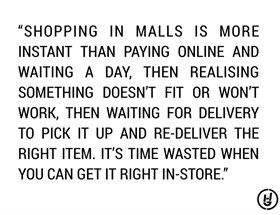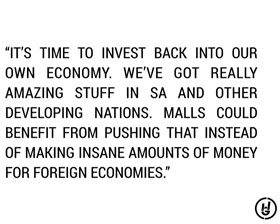The millennial mindset and the future of the shopping mall

At the recent SACSC Research Conference in Johannesburg, Kate Snyder, head of anthropology at Instant Grass International, delved into what makes this consumer group tick. Sharing insight from qualitative data analysis carried out by Instant Grass International, Snyder unpacked the South African millennial mindset and how it’s shaping the future of shopping malls.
They still shop in malls
Despite being digital natives, the majority of millennials Snyder interviewed still prefer to visit malls to fulfil their shopping needs. “They’re tactile creatures and require the tangibility of going to the store – touching the quality of garments, trying things on, seeing if it fits…”
Their hesitance towards online shopping persists due to fears relating to online transaction security and concerns that packages will never arrive. And because they crave instant gratification, they want things immediately.
Importantly, they expect more of a seamless integration between online and physical shopping spaces. “What they want is more digital assistance with their actual shopping. They want things like free and strong Wi-Fi access, and personal shopping apps that show them where things are available in stores that would fit their wants and needs.”
They value experiences over things
Millennials prioritise experiences over things. Snyder says this isn’t so much about having altruistic interests or connecting with themselves or nature... it’s mostly for Instagram. “Everything that young people are doing these days is online – what they eat, where they shop, who they’re hanging out with. It’s about finding new ways to fulfil themselves.”
Snyder noted that when asking interviewees the reasons they visit malls, actual shopping was not the main driver. Responses instead centred around socialising with friends and dining at restaurants. They wanted to see and be seen.

“Our malls need to become fully experiential places. They need to be cultural and social hubs above and beyond shopping. Millennials want a 360-degree experience.”
When posed with the question “What are you looking for out of your mall experience,” Snyder says safety and security remained huge concerns. In addition to this, the respondents desired an integration between indoor and outdoor spaces and noted trendy restaurants as a big drawcard. They also want beautiful architecture, a focus on entertainment, novel concept stores, working hubs and interesting spaces like an art gallery or skate park.
They need instant gratification
Millennials expect everything to be at their fingertips. According to Snyder, they want convenience and immediacy, and they expect that experience from their malls as well.

Tying into the slow uptake of online shopping, millennials believe shopping malls to be more instant, illustrated in the interview response to the right.
Snyder also stated that millennials want a one-stop shopping experience – convenience above all else. In the future, they’d like tools that will hasten their shopping experience. They mentioned everything from around-the-clock shopping hours to in-mall travellators, to smart trolleys able to transport goods to the parking lot for them.
They’re heavily influenced by social media
Living in the ‘influencer age’, millennials are heavily influenced by being online all the time. While the actual purchasing is happening in the physical store, the shopping is happening on social media.
“The future of malls rests on millennials’ voices being heard via social media, by both their followers and by brands. Millennials are choosing where to eat and shop based on what they’re seeing in social media posts. It’s going to be really important for not only brands, but shopping centres and retailers to capitalise on that. Influencers are not only creating content but they’re creating culture and beliefs.”
“Brands are starting to tap into influencer marketing and think that if they hire influencers and throw product at them, people will, in turn, buy that brand. But it’s more about creating a narrative that people who are influential online are sharing.”
She said that shopping malls should create environments where influencers naturally want to see and be seen.
They’re interested in local brands
Snyder believes glocalisation to be one of the most important characterises of the South African millennials mindset today. The term refers to how South African youth are living in both a global and localised world. While US and UK influences abound, there’s an increasing interest in local heritage and culture.

Millennials expect malls to think global but act local. They want malls to showcase the talent of local designers alongside the big global name brands. Snyder said that responses like the one to the left illustrate that millennials are not pure status seekers, that there’s an admirable consciousness present in them.
Snyder said: “Global brands are aspirational; they’re the ones that they need to have in order to attain a certain status. But local brands are inspirational; they give them faith in the community around them, make them feel proud to be South African and motivate them to be creative and contribute towards society.”
The SACSC Research Conference was held on 17 May 2017 at The Maslow Hotel in Sandton, Johannesburg.
About Lauren Hartzenberg
- Celebrating African creativity: Lucky Star and Chepa Streetwear collab on Phatsimo collection - 7 Jun 2023
- PayJustNow's CEO on the benefits of 'buy now pay later' for consumers and businesses - 6 Jun 2023
- #YouthMonth: Glow getter Ayanda Majola talks Yanda Cosmetics venture - 2 Jun 2023
- SA retailers and consumers count the costs of a collapsing state - 1 Jun 2023
- Jane Wurwand's journey building the Dermalogica skincare empire - 22 May 2023
View my profile and articles...
